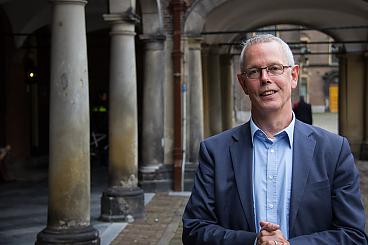'Enhanced legitimacy, credibility, impact, and relevance': SP Senator's resolution improves working of Council of Europe
'Enhanced legitimacy, credibility, impact, and relevance': SP Senator's resolution improves working of Council of Europe
Following hours of debate and months of preparatory work, the Parliamentary Assembly of the Council of Europe (PACE) this week agreed to proposals from SP Senator Tiny Kox aimed at improving the functioning of the Assembly and the Council of which it forms part.
 “Much to most people's surprise, the proposals were carried by the requisite two-thirds majority,” said Kox, who forms part of the Dutch delegation to PACE and chairs the United European Left Group in the Assembly. “They ask the Council of Europe to focus on the protection and improvement of human rights, the rule of law and democracy, to modernise its working methods and develop better relations with national parliaments, the European Union and other international organisations. In order to become more decisive and influential, PACE, in which the parliament of every member state is represented, must improve its cooperation with the Committee of Ministers, the decision-making body in which the governments of all forty-seven member states are represented. Only in this way can Europe's oldest and biggest treaty-based organisation win over opinion and better contribute to greater European unity on questions of human rights, the rule of law and democracy.”
“Much to most people's surprise, the proposals were carried by the requisite two-thirds majority,” said Kox, who forms part of the Dutch delegation to PACE and chairs the United European Left Group in the Assembly. “They ask the Council of Europe to focus on the protection and improvement of human rights, the rule of law and democracy, to modernise its working methods and develop better relations with national parliaments, the European Union and other international organisations. In order to become more decisive and influential, PACE, in which the parliament of every member state is represented, must improve its cooperation with the Committee of Ministers, the decision-making body in which the governments of all forty-seven member states are represented. Only in this way can Europe's oldest and biggest treaty-based organisation win over opinion and better contribute to greater European unity on questions of human rights, the rule of law and democracy.”
What's proposed is a “joint reaction procedure” involving both of the Council of Europe’s statutory bodies, and the Secretary General, in cases where a member state is believed to have violated its statutory obligations or failed to respect fundamental principles and values. Such a procedure could be triggered by the Assembly, the Committee of Ministers or the Secretary General, and all three would participate. It would consist of a step-by-step process, which would include notification of the member state concerned, followed by a number of concrete and well-defined steps, such as a co-ordinated dialogue with the state concerned. Next, a special monitoring procedure would be established involving a joint task force and leading to a public statement.
“Ultimately, a state could be suspended, but these proceedings would be designed to avoid things ever getting that far,” Kox explained. “They would ensure that any measures taken as regards an individual member State would have enhanced legitimacy, credibility, impact and, relevance.”
To date the Assembly has had no formal influence in the decision-making body which represents the forty-seven member state governments, and, in Kox's view “the result has been that governments have not been pushed into action when it was necessary to do so. This has led to a great deal of discontent and very little decisiveness. Following the adoption this week of my proposals, there's a clear roadmap on the table which will enable us to act together when necessary, instead of being divided, as was the case with Russia's annexation of the Crimea. Despite determined resistance, principally from British Conservatives, Ukraine and the Baltic states, who don't want to see any rapprochement with Russia, I unexpectedly won major support for my plans. These foresee that Russia can once again contribute to the work in all of the Council's bodies and no longer threaten to resign.”
The new roadmap will now be presented to the next conference of member states' ministers of foreign affairs which will be held in mid-May in Helsinki. Kox is optimistic. “In the last few weeks I've had support from the Finnish Foreign Minister, who's also currently Chair of the Council of Europe, and from the organisation's Secretary-General,” he notes. “Now my colleagues in PACE have also expressed their support, the Council of Europe will probably be able to tackle its current political and financial problems more effectively and better attend to the interests of the 835 million inhabitants of its forty-seven member states.”
- See also:
- Europe
